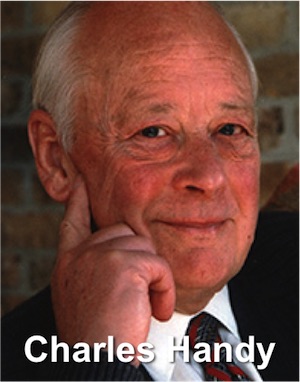In my research for this article, I found an unreferenced remark, suggesting that it was The Economist magazine that coined the term ‘management guru’, and that they first used it as a description of Charles Handy. Handy rejects the label – and so he should. It almost belittles the breadth of his thinking. From organisational theory, to management trends, to social polemic; Handy’s thinking goes well beyond easy categorisation.
Short Biography of Charles Handy
Charles Handy was born in a small town a few miles outside of Dublin, in Ireland, in 1932. He was educated in an English public school, and at Oxford University, where he gained his MA in ‘Greats’ – classical history and philosophy. He went from there to work for Shell, taking a number of operational roles around the world, where he had great autonomy as a young manager. Returning to London, he found headquarters life didn’t suit him. What did, however, was a transfer to the staff college, where he found teaching much more to his liking than corporate administration.
MIT Sloan School
Having taught himself the basics of economics earlier on, so he could take up a role at Shell, he moved briefly to Anglo American as an economist, before travelling to MIT to study at the Sloan School of Management. here he met and studied among some of the greats of US management theory: Warren Bennis, Chris Argyris, and Edgar Schein, who supervised his studies. He was greatly influenced by them all, and also by the work of Douglas McGregor, who had also worked there and died a little before Handy arrived in 1965.
He returned to London to set up the Sloan Program at the newly founded London Business School, where he became a professor in 1972. It was there that he wrote his first book, Understanding Organizations, which has remained in print pretty much ever since 1976, with new editions updating it for modern readers. It is still a first rate introductory text, of which Handy says that he wrote it to get to grips with the ideas in it. He also (famously) recommends that once you have read it, you should re-write your own version and burn the original. In part, Pocketblog is my attempt at re-writing his book, though I never plan to dispose of my trusty 1993 fourth edition!
Handy finds his Voice
Whilst Understanding Organizations is very much a compendium and synthesis, Handy’s next book introduced his own ideas. 1978 saw the publication of The Gods of Management. We’ll take a look at the ideas in this book in part 2 of this blog.
In 1977, Handy left academia, in search of a somewhat more spiritually rewarding role. He found it in an organization set up by Prince Philip the Duke of Edinburgh, and the Church of England. St George’s House is an institution that encourages business and political leaders to come together, along with faith leaders, to consider contemporary and societal issues. His post as Warden allowed Handy to marry his philosophical and commercial instincts.
Portfolio Career
However, in 1981, Handy left, to pursue a new direction in his working life. This was a direction signposted in one of his most important books, 1984’s The Future of Work. In it, he signposted the development of portfolio careers, and the downshift from high-powered corporate jobs (the rack he had been on at Shell) to lesser-paid, but more congenial lifestyle careers. He embraced this downshift through the 1980s and started his own portfolio career that has served him to this day.
Handy further developed the ideas from The Future of Work in 1989’s The Age of Unreason. This book is full of ideas that we will explore further in part 2 of this blog. At its heart is Handy’s rejection of people as human ‘resources’. In modern organizations, we will want to assert our individuality.
A Stream of Ideas
The late 1980s and early 1990s were a particularly prolific time for Handy. He contributed to Making Managers, which sparked a new focus on management as a professional discipline, rather than a simple set of tasks, and led to the growth in the UK of management qualifications, and wrote Understanding Voluntary Organizations. In 1991, he presented a BBC TV series called Inside Organisations, and published a book by the same name, which set out 21 management concepts or ideas. Handy chaired the RSA from 1988-89.
His more philosophical leanings emerged from 1994, when he wrote one of his biggest selling books, The Empty Raincoat, about the emptiness at the heart of global economic growth. In the US, it was called The Age of Paradox. This book may be the most prescient among many of his works that seem that way.
Handy has barely let up with a stream of new books with new and interesting ideas:
- 1996 Beyond Certainty about how organisations need to adapt, to make the best of uncertain futures
- 1997 Hungry Spirit about the limitations of a materialistic capitalist culture
- 1999 The New Alchemists about the inventors and entrepreneurs who create something out of nothing
- 2001 The Elephant and the Flea about the relationship between individual professionals and small scale entrepreneurs (the fleas), and large corporations (the elephants)
- 2006 The New Philanthropist about the current generation of real-world philanthropists
- 2007 Myself and More Important Matters about dilemmas and decisions across his long life
- 2016 The Second Curve about the sustainability of the current economic system in the West
A Summing Up
Without a doubt, Handy is a prodigious thinker. He has done and written so much, that we have to consider him one of the few of our Management Thinkers and Doers for whom a single article is not possible. Like another great, Peter Drucker, Handy is one of our foremost commentators on the nature of organisations. And like Drucker, his ideas have ranged well beyond that field. In Part 2 of this article, we will focus entirely on some of Handy’s biggest and most important management ideas.


